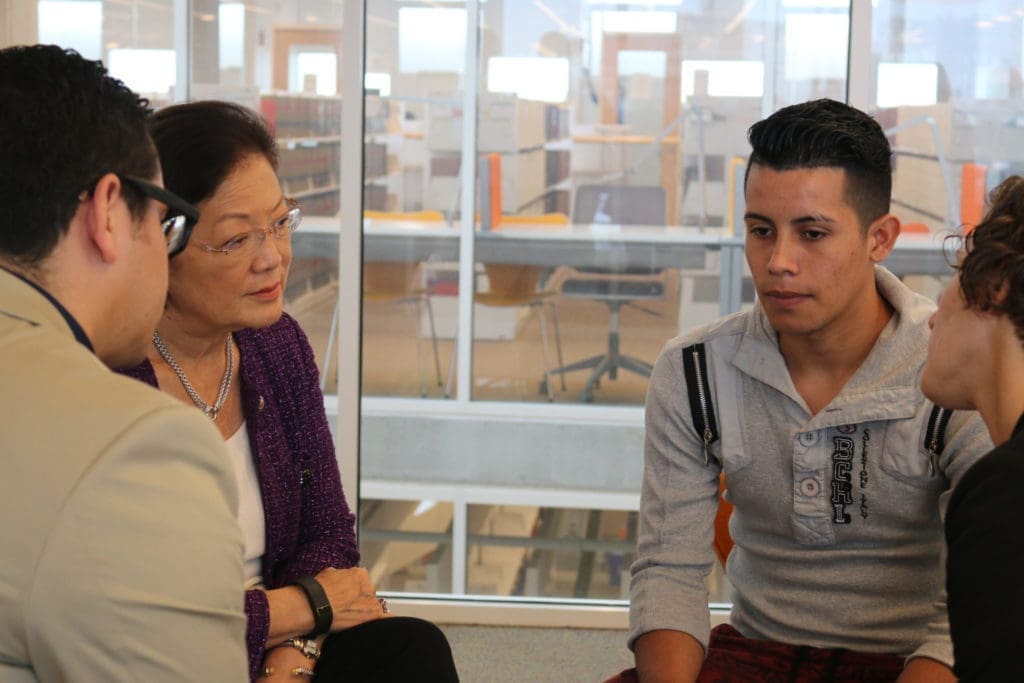Upon entering the first courtroom, I immediately encounter a multitude of families waiting for the proceedings to begin. There is a father with two small children and a baby sleeping on his shoulder. The little girl with him holds a lunchbox decorated with characters from the movie “Frozen.” They’re in court without a lawyer seeking legal immigration status. Without an attorney, their odds of being allowed to remain legally in the United States are significantly lower than those who have lawyers to present their cases. In fact, only one in ten unaccompanied children who lack attorneys gain legal immigration status, and unaccompanied children with attorneys are five times more likely to be successful in their claims than those without. As I watch the courtroom proceedings, I begin to truly understand those odds.
From there, we move to a second courtroom, where the judge calls up the cases involving children who have lawyers representing them. A lawyer and a young boy, his client, go to the front of the room. A lawyer for the Department of Homeland Security serves the boy’s attorney with a stack of papers that is two inches thick – a daunting amount of paper when I think of the children who do not have attorneys to help them wade through it all.
Moving onto another case, the judge admonishes the child’s lawyer because the child’s custodial guardian is not present in the courtroom. While the lawyer was able to respond to the judge, I think about the unrepresented children – what would they say if a judge similarly admonished them? And how would they feel being totally alone in that courtroom without a lawyer or a custodial guardian with them?
As I witnessed the fast pace of the proceedings, I wondered how the kids without lawyers managed to keep up or understand anything that was happening.
After the court proceedings, we all leave the courtroom to go to KIND’s office in Baltimore. There, Senator Hirono speaks with former KIND clients who had fled gang violence from Central America and had since secured legal immigration status in the United States.
Senator Hirono speaks with two girls who have been granted asylum. One girl is still in high school; the other has recently graduated and is working to save money for college. They’re grateful that they were able to escape the dangers of their home countries but both stated they would not have been able to succeed in their cases without the KIND lawyers.
The third former KIND client is a boy who fled from Honduras. He wants to go to university, help his family, play soccer, and be a mechanic. When the Senator asks him about his legal status, he says he has asylum, but the attorneys quickly correct him, noting that he has Special Immigrant Juvenile Status. I am struck by this exchange as I consider that even after going through the entire immigration process with an attorney, the specific legal phrases and concepts are still unclear to him.
After speaking to the children, Senator Hirono talks about her passion for helping immigrants and working for immigration reform. The Senator then asks the KIND attorneys if these children can now petition for legal status for the rest of their families. She is concerned about the possibility of family reunification. They explain that some kids are never able to petition for their parents because of the form of relief they pursued. I am struck by these different consequences that result from the various forms of relief, and wonder again how a child without a lawyer would know of such consequences..
Throughout the day, I think about how a child is supposed to navigate the complex immigration system without a lawyer. Courtrooms are intimidating, judges are busy, and the law is complicated. At every step, children who cannot afford an attorney or find pro bono help must face these multiple challenges alone.
But champions like Senator Hirono are working to change that. She is a cosponsor of a bill that Senator Harry Reid (D-NV) introduced earlier this year that would alter the status quo. The Fair Day in Court for Kids Act (S. 2540/H.R. 4646) would provide all unaccompanied children access to counsel in their immigration proceedings, regardless of their ability to pay for an attorney. This bill, if enacted by Congress, would mean that these children would not have to stand in immigration court alone.
After my day in court, I think that’s the least we can do for them.
Mary Elizabeth Maffei is a third year law student at Georgetown University Law Center. She is participating in the Federal Legislation Clinic, which is working with KIND on their advocacy efforts on behalf of unaccompanied children in the immigration system.

